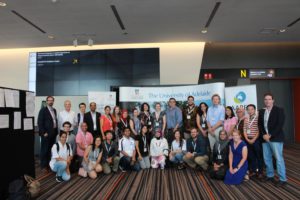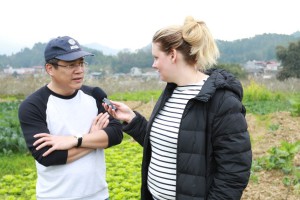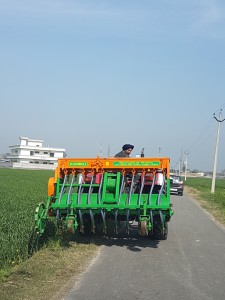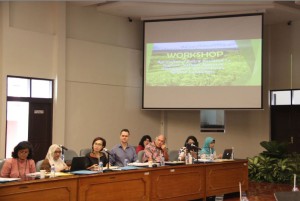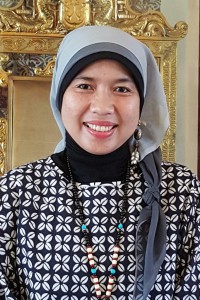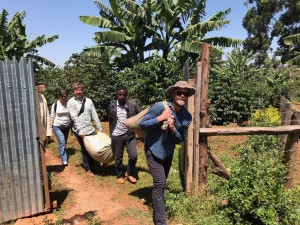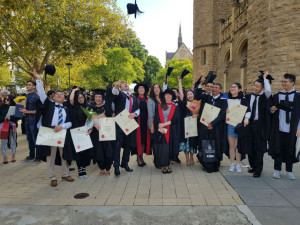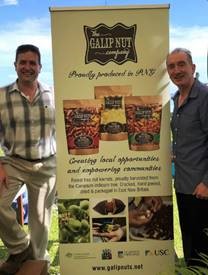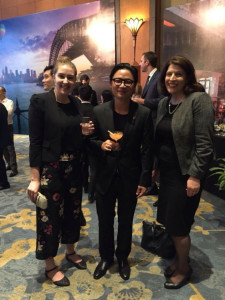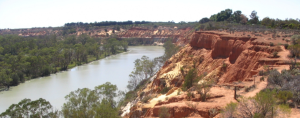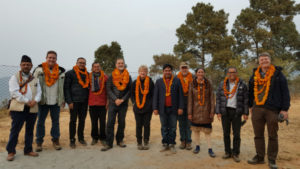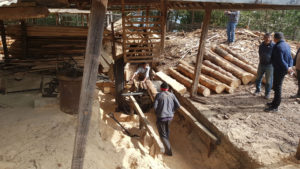In the final GFAR blog of 2018, we continue to look back into highlights of our research activities, staff and student contributions, contributions to development of policy of GFAR researchers through the blogs we have shared this year from July to December.
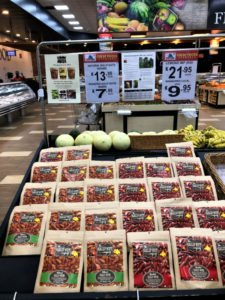
Galip Nut in ‘Fresh Produce’ section
July kicked off with the commercialisation of Galip Nut in Papua New Guinea. Commercialisation of the Galip Nut has provided positive substantial benefits to the local economy in PNG. Women conduct the majority of the Canarium tree growing and trading activities, including nut collection, cracking, drying and selling. The project centred at the NARI pilot plant in Kerevat East New Britain (ENB) has contributed to the development of value added technologies that will enable efficient and safe processing of nuts with resulting increase in productivity. This project has taken a whole of value-chain approach, and offered a range of interventions such as market research, technical advice, capacity building, business mentoring and access to infrastructure for both private and public sector stakeholders.
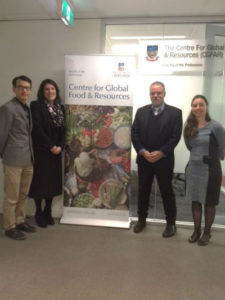
Dr. Alec Zuo, Prof. Wendy Umberger, Mr. David Ironside, and Prof. Sarah Wheeler
In July, GFAR researchers Dr. Alec Zuo, Prof. Wendy Umberger, Prof. Sarah Wheeler and Dr. David Adamson met with Mr. David Ironside, Assistant Secretary, Plant Export Operations, Biosecurity Plant Division, Department of Agriculture and Water Resources (DAWR) to discuss a new project titled “Understanding parallel trade of Australian products to China” under the Agricultural Trade and Market Cooperation (ATMAC) program funded by the DAWR. The project is looking at alternative export pathways to the Chinese market for Australian fresh produce. In particular the profile of Chinese buyers of Australian products will be created for the first time using a unique large industry dataset, in terms of geographic location, age and gender.
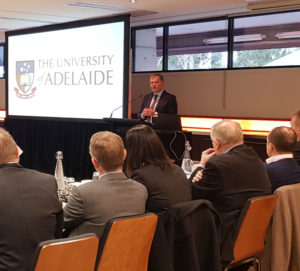
Prof. Peter Rathjen, Vice-Chancellor and President, University of Adelaide
GFAR hosted the Agribusiness Advisory Board Forum on ‘Profitable Agribusiness: Key drivers, constraints and the role of University of Adelaide’. The idea behind the forum was to hear views of key guests on the future of agribusiness and implications for university and government. Industry leaders from South Australia were also invited to speak at the forum. Some of the key issues discussed in the forum were on challenges relating to the need to constantly reduce operating costs to be viable for small and medium sized agribusinesses. How can research in areas like value chain analyses, affordable mechanisation and lean manufacturing techniques help in dealing with these challenges. The challenge of finding good people with the skills for constantly evolving businesses is always a major one. How can educational programs like the ones offered through GFAR provide the industry with graduates that have skills required by the industry? In addition to these issues, other aspects of continued collaboration with the industry through sustenance and development of comprehensive internship programs and access to university expertise for industry were discussed at the forum.
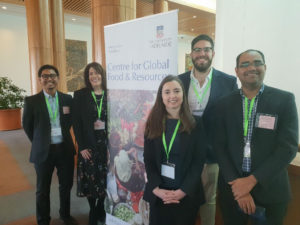
From left to right: Rida, Prof. Wendy Umberger, Prof. Sarah Wheeler, Jack Hetherington, and Rohan Yargop at the Crawford Fund Conference
August was all about conferences! Rida Akzar, a PhD student at GFAR was awarded a scholarship to attend the 2018 annual Crawford Fund Conference. The theme for this year’s conference was ‘Reshaping Agriculture for Better Nutrition – The Agriculture, Food, Nutrition, and Health Nexus’. Rida was one of the 44 young scholars chosen from across Australia after a competitive selection process to attend the conference. The conference was held in The Parliament House in Canberra from 13th to 15th August 2018.
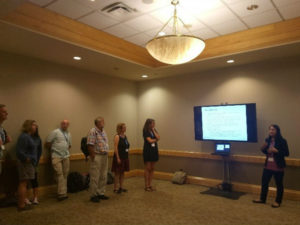
Rio Maligalig during her presentation at ICAE
GFAR researcher Rio Maligalig and PhD Student Phassara Khamthara presented at the 30th International Conference of Agricultural Economists (ICAE) which was held in Vancouver, Canada from 28th July to 2nd August 2018. ICAE is the flagship conference of the International Association of Agricultural Economists (IAAE) and is held every three years. The theme of this year’s conference was “New Landscapes and New Mandates for Agriculture”. Rio Maligalig presented her paper in this category under the Data and Methods and Price Analysis session. The title of the paper was “Farmer preferences for rice varietal trait improvements in Nueva Ecija, Philippines: A latent class cluster approach” co-authored by Prof. Wendy Umberger, Dr. Alexandra Peralta and Dr. Matty Demont from the International Rice Research Institute (IRRI). Phassara Khamthara presented her paper “Horticultural Development and Its Welfare Implications on Household Education Investment in Indonesia” co-authored by Dr. Di Zeng and Prof. Randy Stringer, under the visual contributed paper session “Household economics and Food waste”.
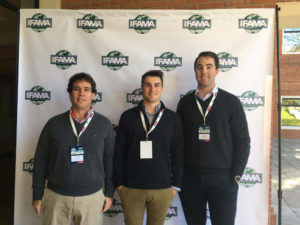
Giancarlo, Edward and James at the IFAMA 2018 conference
In August, we reported on our Master of Agribusiness (MAB) students Edward Fowler, Giancarlo Cassinelli and James Mumford who travelled to Argentina to participate in the case study competition of the 2018 International Food and Agribusiness Management Association (IFAMA) annual conference. This year’s case study was titled “Food Chain Partnership: Developing neglected and underutilised species through Shared Value Initiatives” and focused on the Bambara Groundnut Project in Indonesia – a real life collaborative partnership between Bayer and NGO Plant Breeders Without Borders. The paper explored the concepts of shared value and student teams were instructed to present a 15-minute presentation on the value chain and why Bayer should partner with the NGO. Although the students did not proceed to the final round, it was an invaluable experience competing on the world stage, putting into practice what they had learned through the Master’s program as well as crucial skills such as critical thinking and presentation ability. A highlight for our students was meeting 22 other student teams from around the world.
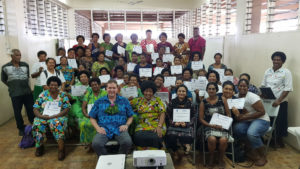
GFAR Associate Director, Craig Johns with the group of women after the training workshop
In August, Craig Johns travelled to Fiji to conduct practical workshops in municipal markets and small communities across the island of Vanua Levu in Fiji. The training program contained a number of sessions over the course of a full day, covering the important topics of food safety, food value adding and value chain business skills for selling into new markets. The audience was predominantly women who had sacrificed their daily earnings behind the counter of their fresh produce market stall to come along and learn how to reduce their food waste, produce new, safe, value added food products and better understand their business and the costs of the products they sell. Initially designed for groups of 35, the strong demand saw the rooms swell to their capacity of more than 40, resulting in extra sessions being added to the program. In addition to the enthusiasm displayed during the sessions, subsequent messages of thanks were also received advising that some of the women have already started making jam and chutney products of their own with the intention of testing them in their own market stalls before they investigate opportunities to sell into some of the smaller hotels in town.
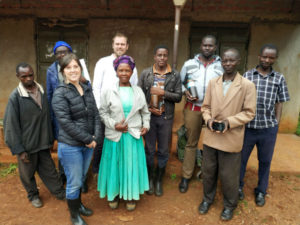
The research team with coffee growers
In September, GFAR researchers Dr. Daniel Gregg and Prof. Randy Stringer spent some time in Uganda to run coffee picker contracting experiments and identify efficient methods to assess quality of coffee cherries. The aim of the coffee picker contracting experiments was to find labour contracts, which are efficient, in that they generate incentives for picking high quality cherries only, and fair, in that they provide pickers with more income than in the normal case. GFAR researcher Alexandra Peralta also visited Uganda with colleagues from the Michigan State University to conduct field experiments for the ACIAR project on ‘Developing value chain innovation platforms to improve food security in East and Southern Africa’. With the help of our local partners at Makerere University – Prossy Isubikalu and brilliant master students, Kapchowra District Landcare Chapter (KADLACC), local enumerators, and Cansin Arslan, a PhD student at the University of Gottingen, 10 sessions of trust games were implemented, together with a risk game and a dictator game, with farmers and traders from the Mt Elgon region in Uganda. The objective was to measure trust experimentally and use results to help design interventions aimed at improving trust among value chain actors.

GFAR Associate Director of Research Prof. Sarah Wheeler was one of 11 scientists and economists who published a paper in the prestigious Science Journal on ‘The Paradox of Irrigation Efficiency- higher efficiency rarely reduces water consumption’. The lead author of the paper is Prof. Quentin Grafton of Australian National University. The paper discusses the fact that concept of irrigation efficiency (volume of all irrigation water beneficially used on the field to the total volume of irrigation water applied) which provides benefits to irrigators, however, fails to deliver public good benefits of increased water availability. The paper argues that irrigation efficiency measures must be accompanied by strong water accounting and measurements, a cap on extractions, an assessment of uncertainties, the valuation of trade-offs, and enhanced understanding of the incentives and behaviour of irrigators.
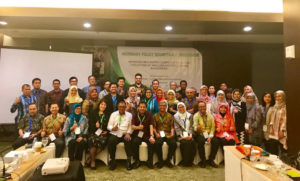
Participants of the Indodairy Policy Roundtable Discussion
In October, GFAR researchers Jack Hetherington and Prof. Wendy Umberger travelled to Indonesia for the IndoDairy Policy Roundtable Discussion where results from the key activities of the project which include implementation of a dairy farm household survey, value chain analysis of dairy value chains in West Java and North Sumatra, review of existing policies for the dairy sector in Indonesia and guidelines and opportunities of heifer importation from Australia to Indonesia were shared with policy makers from the Indonesian Government. Key Indonesian government officials attended the policy roundtable from the Ministry of Coordinating Economic Affairs, Ministry of Agriculture, Ministry of Industry, Ministry of Trade, Ministry of Livestock and Animal Health, Ministry of Cooperatives and small to medium enterprises and key members of the IndoDairy project team.
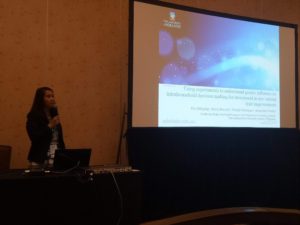
Rio Maligalig during her presentation at the IRC2018
GFAR researcher, Rio Maligalig, participated in the 5th International Rice Congress (IRC2018) held in Singapore from 15 to 17 October 2018. The congress is held every four years and is the world’s largest gathering of scientists, researchers, industry experts and players in the rice sector. The theme of this year’s congress was “Transformative Science for Food and Nutrition Security”. Rio presented her paper in the IRRC 2018 under the theme “Social inclusion and gender equality”. The paper, co-authored with Prof. Wendy Umberger, Dr. Alexandra Peralta and Dr. Matty Demont (International Rice Research Institute (IRRI) Senior Economist), examined intrahousehold decision making on investment in rice breeding for future rice varietal trait improvements using the Investment Game Application (IGA) developed at IRRI.
Each year The Australian Farm Institute hosts a Roundtable conference with a topical theme. This year the conference was held at the National Gallery of Australia in Canberra on Tuesday 16 October with the theme “Evidence meets emotion”. This theme follows on from their John Ralph Essay competition earlier in the year on the topic “society should determine the right to farm”. Nikki Dumbrell attended the conference and also participated in the essay competition in which she stood runner-up. The essay competition and conference were both designed following recognition of the importance of the community and consumers exerting influence on the actions and behaviours farmers are allowed to take on farm and the decisions they make regarding where to sell their produce. A term commonly used to refer to ongoing acceptance of actions or behaviours by local communities and stakeholders is the ‘social licence to operate’.
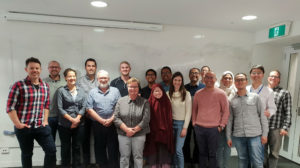
RAID Workshop Participants
In October GFAR PhD students got the opportunity to learn the ropes of leadership and management in international R4D. The workshop was organised by Researchers in Agriculture for International Development (RAID) and The Crawford Fund. The two and a half day workshop was aimed at presenting participants tools related to managing and leading in the context of agricultural research for international development. The workshop and the panel session provided our students with new skills to better ‘navigate’ their professional environment. In addition, it was a valuable chance to get to know researchers from other institutions and outside academia, to share their thoughts and current activities with them.
Researchers at the Centre for Global Food and Resources (GFAR) are involved in a multidisciplinary research-for-development project improving the profitability and sustainability of smallholder vegetable farms in the north-west (NW) of Vietnam. Some of the results and impacts from the project have been captured in a short film .
We ended the year on a high note at GFAR with the launch of our first MOOC (Massive Open Online Course) on “Understanding Agribusiness, Value Chains, and Consumers in Global Food Systems”. The course looked at what sets agribusiness apart from other business sectors and the difference between supply chain and value chain thinking. It explored the concept of agrifood markets and the distinctive factors that influence them. There was a focus on the role that consumers play in the value chain – why they make the food choices they do and what changing food demand means for agribusiness. This course showcased Australian agribusinesses, providing genuine insights into the concepts discussed. More than 3000 students from more than 156 countries participated in this online course which concluded recently on 13th December 2018.
We are thankful to our regular contributors and readers of our blog series. We wish you a happy and safe holiday season and look forward to bringing you more exciting stories from GFAR in 2019!


